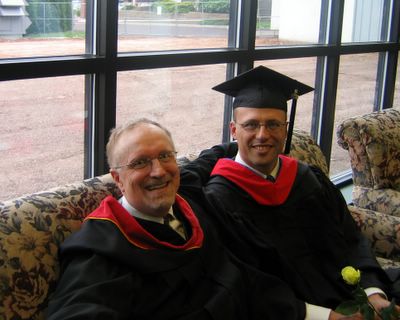Getting Offensive
So I posted a job description recently over on Wayfaring Pilgrim: "Wanted: ORFWB (Outgoing. Reformed. Female. With a Brain)." And that last little phrase has been drawing some fire.
Typically, complaints run something like this: "Hey, what's with this 'with a brain' part? Do you think most women are stupid? Don't you know how offensive that sounds?"
Which is, of course, not at all what we mean to convey. I've known many people (of both genders) who are smart, nice, good, and very competant at what they do, etc. But I've also worked with a handful of people in my life (again, of both genders) who are exceptional - in terms of their intellect, their ability to communicate, and in this case their understanding of the gospel and their love for the lost. What I'm trying to get at here is that we don't want just anyone for this position - we want a woman who is really sharp, intellectually (and theologically). So how are we supposed to convey that?
It's been interesting how many women have no problem with this language at all. Yet of those who did, most understand our intent, but still find the verbiage offensive. And that got me thinking about the nature of 'offense'.
Offense is a powerful force in our society - it's like approval in reverse. Many times, we use it as a weapon, to coerce people into changing their behavior, to justify rejecting them when they don't. As such, we often go to great lengths to avoid offending people.
We need to be careful in what we say here. Paul talks about being all things to all people in order that he might win some for the sake of the gospel (1 Cor 9:22). He seeks to avoid offending people - not simply because 'offense' is something bad to be avoided at all cost, but rather because the gospel itself is fundamentally offensive, a stone which causes people to stumble (Rom 9:33, etc). And that's important to recognize. There are times when offensiveness is vitally important.
Christianity is a bloody, offensive thing. And that offensiveness is there by divine design, because it requires us to get over ourselves in order to embrace it.
The very nature of 'offense' is that I look down on others (and smile upon myself) because I simply can't believe how right I am and how wrong they are. I am putting my confidence in my rightness, and rejecting others because of their wrongness. The gospel, however, stands this on its head: "You are in the wrong, my friend, so much so that there is no hope for you, at least not in you. Your only hope lies in another (Christ)." And that is very offensive to those of us who are constantly looking for reasons to take pride in ourselves.
One of the things I am finding in church planting is that unbelievers are extremely offensive in many ways - they regularly denigrate God, faith, virtue, and truth. Believers are often just as bad - the regularly take pride in their morality, their spirituality. And both sides often find real Christian faith quite offensive - "Who do you think you are, saying your way is the only way to be saved?", "Who do you think you are, hanging out with those sorts of people?"
Yet if I am to minister to people like these, I must excel at not taking offense. I must have thick skin. I must be able to turn the other cheek. I must love my enemies. I must choose to overlook the offense. I must be willing to bear all sorts of mistreatment - false accusations, misinterpretations, slander, jeering - all for the sake of God's message, that they might hear Christ, and stumble over him perhaps, but never over me.
In light of all this, perhaps it's best to just leave in the "With a Brain" part in our ad. We mean no ill by it (it's a complement, not an insult), and even if we took it out, there would be other things people could be offended by (the fact that we are complementarian, the fact that we are PCA, the fact that we want to hire a woman at all). Ultimately, those who desire to find offense will inevitably be able to find some reason for it if they simply look long enough and hard enough (after all, I really AM a sinner).
At the end of the day, it seems the real question is whether someone can overlook offense for the sake of the kingdom.



